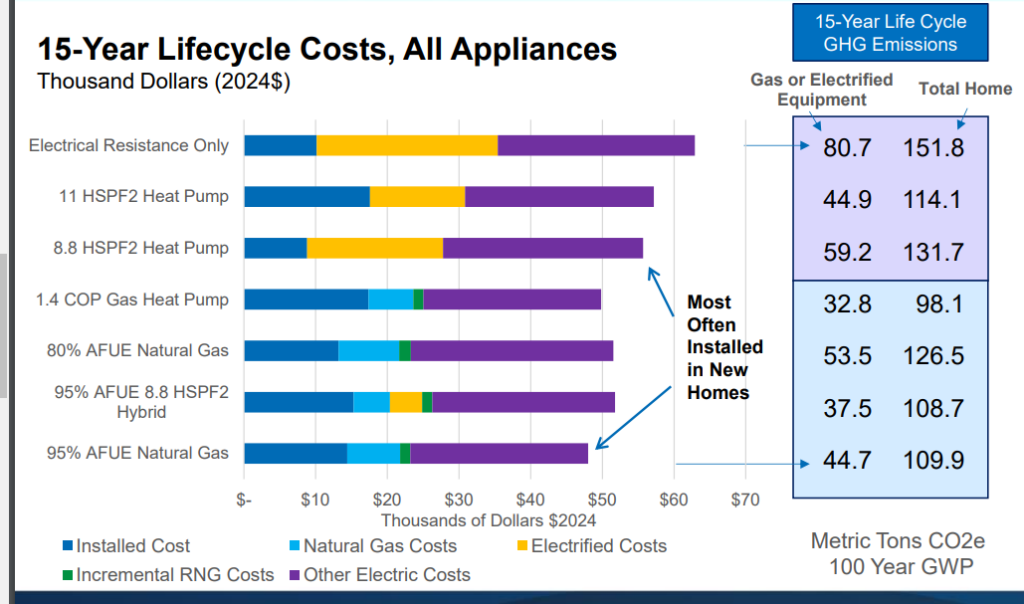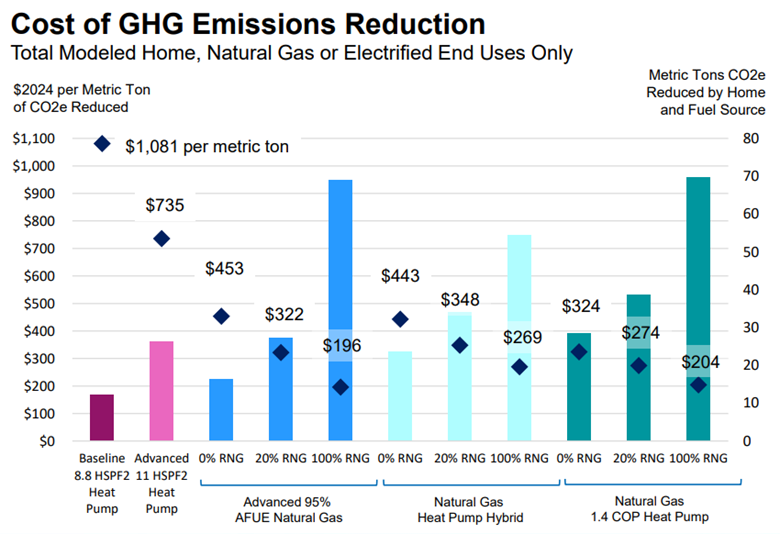Building for Efficiency: The RNG Revolution
The following is part four of our four-part series Building for Efficiency, examining a groundbreaking new report on cost and emissions in new construction. If you’re just joining us, be sure to check out part one, part two, and part three.
Throughout this series, we’ve explored how geography and market forces influence home heating choices, the economics behind those decisions, and how natural gas appliances can offer cost-effective decarbonization solutions. Today, we’re turning our attention to the future: how renewable natural gas (RNG) and innovative technologies like gas heat pumps are set to transform home heating, delivering substantial emissions reductions without breaking the bank.
First, natural gas heat pumps. As previous parts of this series made clear, the installation cost for a natural gas heat pump is virtually the same as that of an advanced electric heat pump. However, electric heat pumps work by moving heat around, not creating it. A natural gas heat pump also moves heat around. When temperatures fall low enough there isn’t enough heat to move efficiently however, it can use natural gas to create its own heat.
Because natural gas heat pumps run on natural gas (currently a third the cost of electricity and projected to remain so for decades), they’re more affordable to run than electric-only heat pumps. A home with a natural gas heat pump would cut costs by $651 per year compared with an electric cold-climate heat pump – close to $10,000 over the fifteen-year lifecycle of the equipment. In addition to the low cost to operate, natural gas heat pumps have one other thing going for them – they have much lower emissions than all-electric heat pumps! Take a look at the charts below for a full cost/emissions comparison.

RNG is becoming increasingly available, with the supply of RNG increasing approximately 400% from 2018 to 2023. By 2040, the production of RNG is expected to offset one-third of total residential and commercial natural gas demand, with an average annualized mix of 20% over the next 15 years. The increased cost relative to the current fuel mix is represented by the little green slices of the lifecycle cost bars. You’ll notice that it doesn’t take much RNG to dramatically lower emissions, with a natural gas home projected to have emission dramatically lower than even the most efficient all-electric home.
Because of efforts by natural gas and electric utilities, a typical new home built today could have 40% lower emissions by 2040. Examine the graph below to see how much those reductions could cost per ton of CO2e reduced.

As the graph above makes clear, innovative applications like natural gas heat pumps or hybrid gas-electric heating systems can cut emissions more cost-effectively compared with all-electric households. Renewable natural gas stands out as an immediate and cost-effective solution for reducing household greenhouse gas emissions relative to all-electric households. Substituting large amounts of RNG while using the most efficient natural gas appliances available stands out as the most cost-effective methods for reducing emissions.
On the electric side, a low efficiency heat pump will cost about $1,081 per ton of CO2e emissions averted, while the most efficient cold-climate heat pumps are only marginally better at $735 per ton. In other words, every dollar invested in reducing emissions goes between three and five times as far if spent on RNG and high efficiency natural gas appliances, with the cost efficiency increasing along with the percentage of RNG in your fuel mix. Regardless, the emissions reductions from natural gas in all RNG blending scenarios (including no RNG at all) are more cost-effective in terms of dollars per ton than either the baseline or advanced cold-climate electric air-source heat pump.
To summarize our key takeaways today:
- Innovative technologies like natural gas heat pumps and hybrid gas-electric heating systems can reduce emissions more cost-effectively than all-electric households.
- RNG is becoming increasingly available and stands out as an immediate and cost-effective solution for reducing household greenhouse gas emissions compared to all-electric options.
- Upgrading to high-efficiency natural gas appliances can decrease natural gas consumption by nearly 50%, meaning less RNG is needed per home to achieve significant decarbonization.
- By 2040, efforts by natural gas and electric utilities could result in a typical new home having 40% lower emissions, offering an affordable pathway to substantial emissions reductions.
- Investing in RNG and high-efficiency natural gas appliances provides a more cost-effective method for reducing emissions, with each dollar going three to five times further than if spent on electric heat pumps.
Thank you for sticking with us throughout the full series on Building for Efficiency! Interested in learning more? The full study is available here, along with other relevant resources.
